Home Safety Checklist For Philadelphia
Staying safe and secure in your house should be your largest concern. But are you missing some key safety components? Look over this home safety checklist for Philadelphia and see where your home requires greater attention.
This guide starts with a few whole-house safety ideas, and then we whittle it down on a room level. Then, contact (215) 798-2927 or complete the form below for more information.
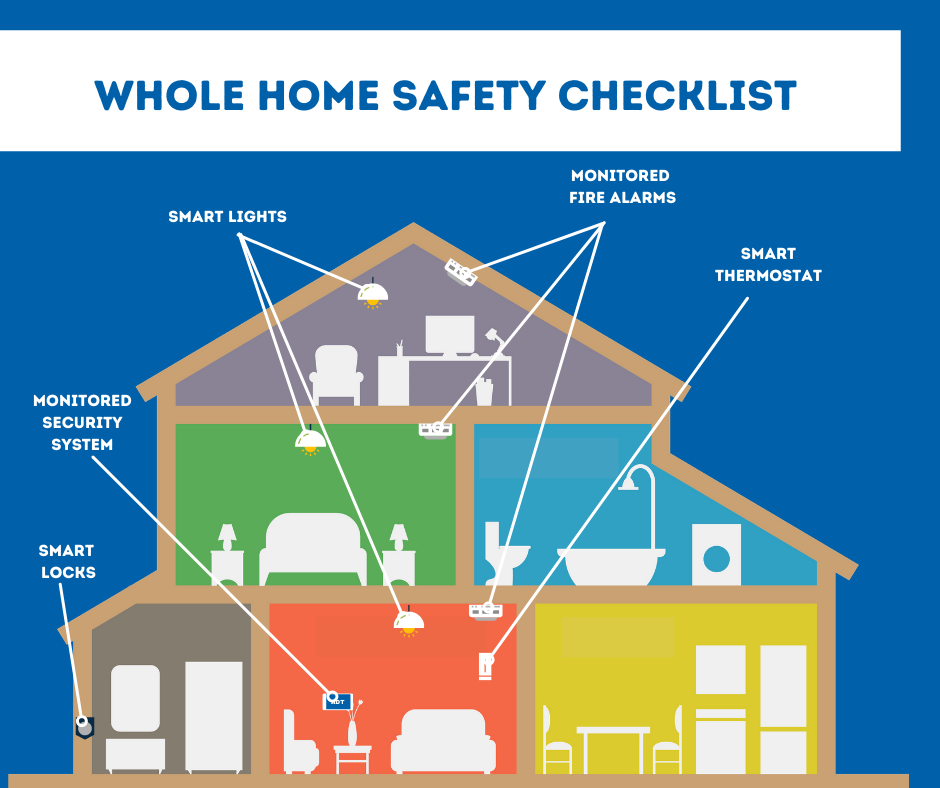
General Home Safety Checklist for Philadelphia
While you will want to use a room-to-room approach to home safety in Philadelphia, there are a few items that are good for the whole house. These devices can talk together through a wireless hub, and oftentimes respond to one another. You can also control every one of your home safety devices using a mobile app, like ADT Control:
-
Monitored Home Security System: All your entryways should have a sensor that notifies your family to forced entry. As an alarm goes off, your monitoring agent picks up the call and calls a first responder.
-
Smart Lights For Most Rooms: Of course, you can program your smart lights to make your house more energy-efficient. But smart lights can also allow you to stay safe in an emergency. Make your smart bulbs flash on when a security alarm triggers to scare off intruders or illuminate the way out to a safe location.
-
Smart Thermostat: Like your smart lights, a smart thermostat in Philadelphia could save you 10%-15% in energy costs. It also can start an exhaust fan if you have a fire.
-
Monitored Smoke Detectors: At the very least, you should have a fire detector on each level. You can increase your fire readiness by installing a monitored fire alarm that looks for unusual smoke and heat, and alerts your round-the-clock monitoring team when it detects a fire.
-
Smart Door Locks: Every doorway that needs a deadbolt can be made safer with a smart door lock. Now you can program key codes to friends and family and get notifications to your phone when the locks are used. Your doors can even automatically unlock, letting you quickly flee the house when you have an emergency.
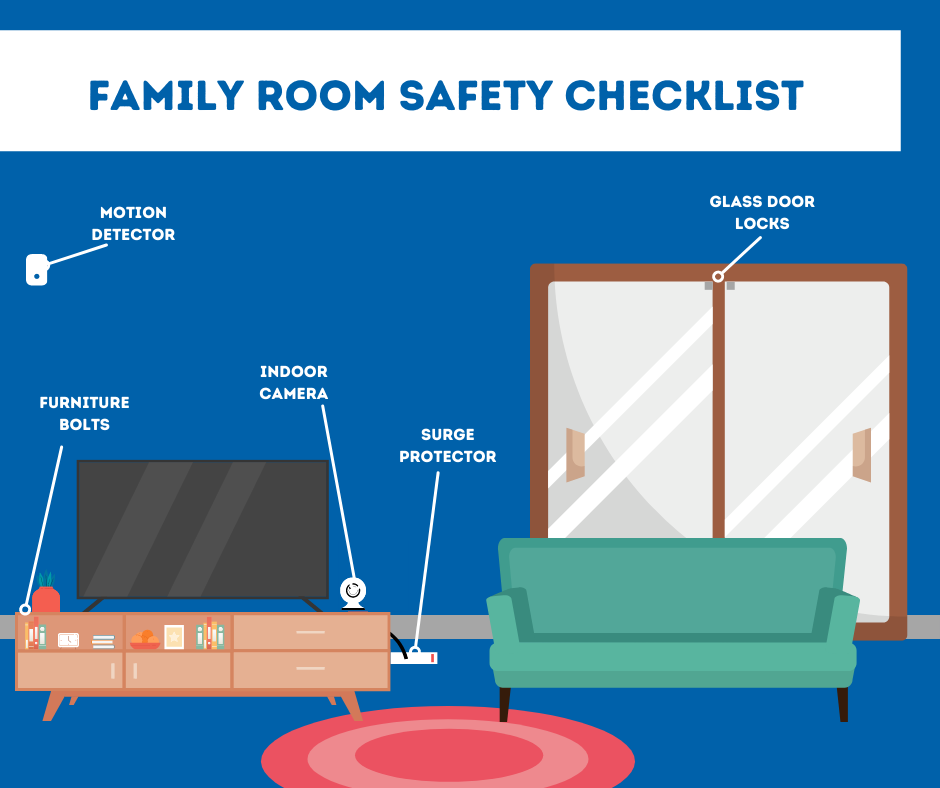
Family Room Safety Checklist For Philadelphia
You’ll spend a lot of time in your living room, so it’s the best place to start making your home a safer place. Popular items, like your TV or video games, usually reside in your living room, making it an alluring area for thieves. Begin with placing a motion sensor or indoor security camera by the doorway, then take a look at all these safety protocols:
-
Motion Detectors: By hanging motion sensors, you’ll get a loud noise if they sense unusual movement in your family room. Look for motion detectors that aren’t set off by pets or you’ll see your sirens go off every time your pet roams by for a bite of food.
-
Indoor Security Camera: An indoor security camera offers a constant watch on your living room. Watch live streams of everything so you can see what’s going on without leaving your bed. Or speak with your family in the living room using the two-way talk feature.
-
Surge Protector/Outlet Maintenance: Protect expensive electronics and stop overtaxing your circuits with a surge protector. For extra energy-efficiency, use a smart plug with surge protection included.
-
Entertainment Center Secured To The Wall: If you have any small children, you’ll want to attach your entertainment center or other heavy furniture to a wall. This is especially crucial if your family room has carpeting that might make heavy objects extra unbalanced.
-
Special Locks For Glass Doors: If your living room uses a sliding door that slides out to a backyard, deck, or porch, you know that the latch is pretty thin. Install a special lock, like a bottom bar or locks that are located on the bottom and top of the opening.
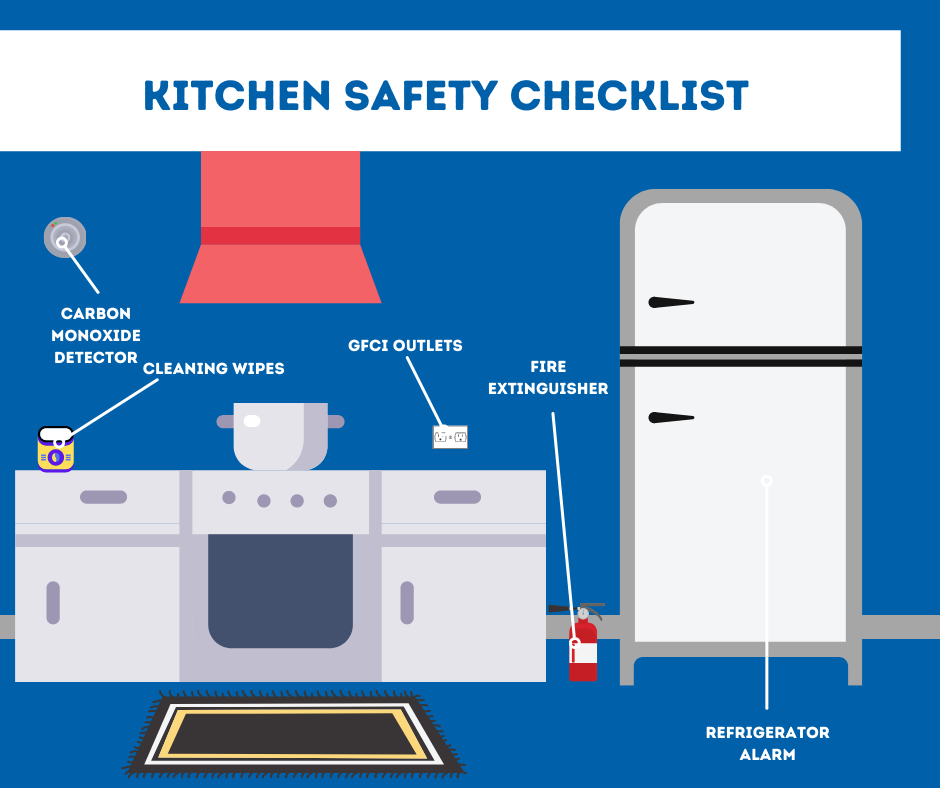
Kitchen Safety Checklist For Philadelphia
The kitchen has room for items that can provide comfort and safety to your house. Many of these things are also a snap to add and should be purchased from the Target or Walmart:
-
Fire Extinguisher: A fire can happen from an overfilled skillet or a towel that’s too close to a burner. Always have a fire extinguisher in close reach for any stove or oven emergencies.
-
Circuit Interrupter Box On Each Outlet: A GFCI outlet should be installed anywhere there’s nearby water to ward off a deadly shock. That includes the outlets around your sink and kitchen counter. Since the late ‘80s, it’s been required to have one circuit interrupter outlet per dedicated circuit. But each one of your plugs will go if one outlet detects a surge, so you’re going to want to use a separate GFCI for every outlet.
-
Monitored CO Detector: A CO detector is recommended for spaces that have natural gas for the oven and stove. If your gas lines malfunction, the carbon monoxide detector will cause a loud noise and ping your monitoring professional.
-
Disinfectant Wipes Or Spray: The largest safety issue in the kitchen is the viruses, bacteria, and cross-contamination from blood from meat and vegetables. Always store antiviral wipes or a bleach spray to sanitize your counters when cooking.
-
Refrigerator/Freezer Alarm: The food items in the fridge need to remain at a cold temperature to be safe to consume. If you accidently leave the freezer or refrigerator door open, then an alarm beep will let you know so you can shut it securely. Some fridges come with this installed, others don’t, and you’ll have to pick up an external alarm from online.
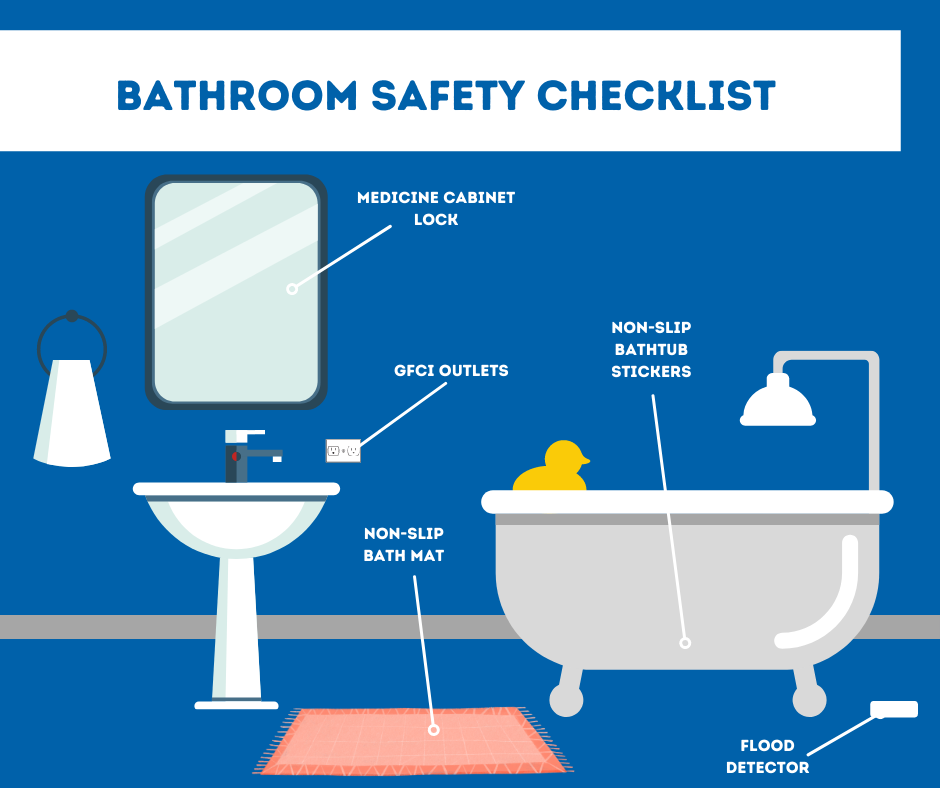
Bathroom Safety Checklist For Philadelphia
Just because you may not have a bunch of room in your bathroom there’s still safety concerns. From flood detectors to medicine care, here are some safety tips for your bathroom:
-
Flood Sensors: A leaking sink or shower can lead to a whole lot of damage. Find a leaking pipe with a flood detector and save yourself from renovating the whole bathroom.
-
Non-slip Bathroom Mats: A fall in the bathroom can be painful, causing bumps, sore joints, or broken bones. Or steer clear from these issues with a non-slip bathroom mat for after your bath or shower.
-
Textured Bathtub Strips: Another water hazard, a tub can be a slick surface to be on. Make sure each tub has some non-slip stickers so your toes have a textured patch for stability.
-
Medicine Door Latch: If you have little kids or someone with memory difficulties, you should take extra care regarding prescription medicine. Hide away your prescriptions by using a medicine cabinet with a latch that locks.
-
Circuit Interrupter Outlet: While installing better outlets in the kitchen, you will have to also put in a safer circuit interrupter outlet on every bathroom receptacle. These will cut the electricity if water enters the outlet or they experience a harmful spike from a curling iron or hair dryer.
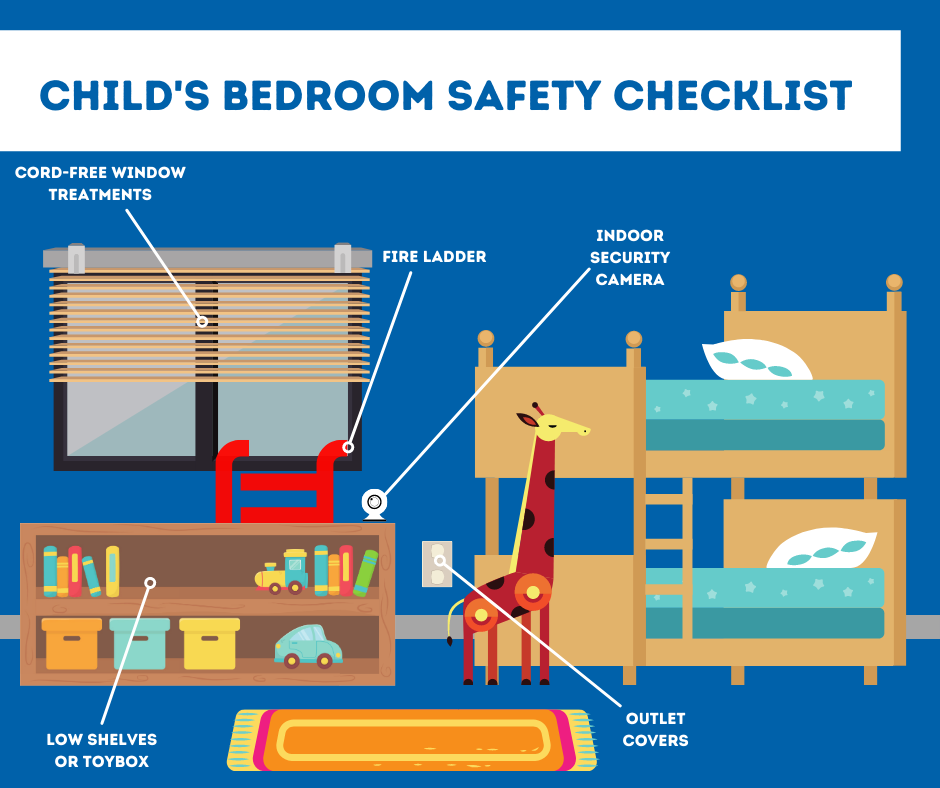
Children’s Bedroom Safety Checklist For Philadelphia
Your child’s bedroom should pair safety with manageability. If their window shades or other items are safe but tricky to use, then your children may try unsafe methods -- like scale a bookshelf -- to use them. Here are 5 simple, and safe, ideas:
-
Cordless Window Coverings: Safety agencies have designated cords from shades and blinds a secret problem for children and animals. Put in motorized treatments that your child can easily open and close through a remote. Or even better, link your motorized treatments to your security system so they can raise on a schedule when the sun comes up, and lower in the evening for extra privacy.
-
Indoor Security Camera: An indoor security camera placed on your child’s dresser can behave like a baby monitor that you can watch from a smartphone. And if they need your help, they can hit the two-way talk button on the camera.
-
Outlet Covers: While each outlet should use covers on them to protect your small children, this is especially important in their bedroom. It’s the one place in your home where your toddler will most likely play by themselves without additional supervision.
-
Window Safety Ladder: If you have bedrooms on an upper floor, then you need to put in a window escape ladder. These should let your children escape even if the stairway or lower levels are blocked off with fire. Make sure to practice how to employ the ladder at least twice a year.
-
Toy Chest Or Low Bookshelves: It’s interesting to think about a toy box as a safety component, but you’ll understand if you’ve ever walked on a Lego in your socked feet. A uncluttered floor means a quick way out when there’s a fire or break-in.
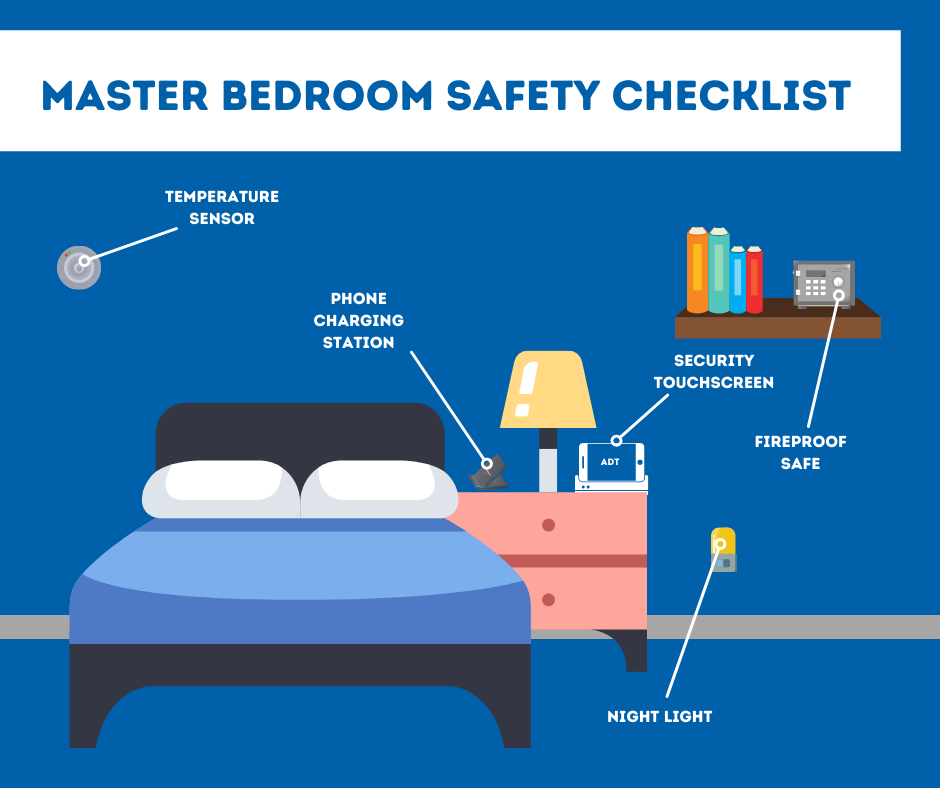
Main Bedroom Safety Checklist For Philadelphia
Your main bedroom should be a refuge, so let your safety devices make you more responsive when there's an emergency. After all, being jerked awake by a loud alarm can be disorienting.
-
Security System Touchscreen: Having a touchscreen on your nightstand gives you a sense of what’s happening without leaving your bed. You could alternatively log into your ADT smartphone app. However, the touchscreen can be easier to manage to use when you’re bleary-eyed and confused.
-
Device Charging Station: We rely on our phones for so much now GPS, news readers, time wasters, and maybe even phones. But, a dead cell will cut us off from the outside world if something goes wrong. To keep it nice and ready, a charging cord or station becomes an essential.
-
Nightlight/Smart Lights: A small light can be a beacon when you’re jolted awake from a siren or other loud sounds. If you won’t drift off to sleep with a small nightlight, use smart bulbs in your bedroom and hall. Then you can have light on-demand with a mobile device or voice command.
-
Fireproof Safe: Store your important papers like birth certificates, stock certificates, or a spare checkbook in a fireproof lockbox. This can be a large one that camps out out of the way or a slender handheld lockbox that you can snatch as you escape during an emergency event.
-
Heat Sensor: The issue with most bedrooms is that they tend to run too warm or be cold because they are far from the thermostat. A heat sensor will communicate to your smart thermostat so you can have a pleasant, relaxing sleep at a wonderful climate.
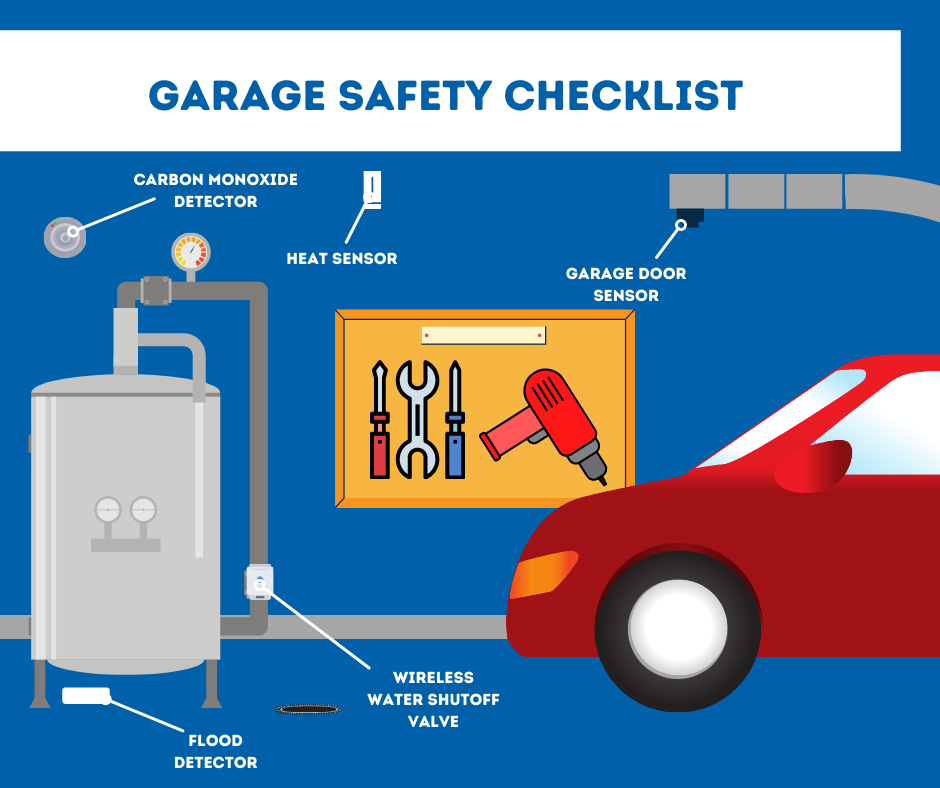
Garage/Basement Safety Checklist For Philadelphia
Most safety problems in the basement or garage have to do with your water or heating system. Finding hazards before they start can stave away larger problems in the future. So, as you walk around your basement or garage, check over these safety items:
-
Flood Detector Or Sump Pump Alarm: Installing a flood alarm in back of your water heater and sump pump can stop you from finding a pond when you go into your garage or basement. The last you need is to spend the weekend getting rid of standing water and salvaging all those soggy boxes.
-
Carbon Monoxide Detector: It’s beneficial to hang a carbon monoxide alarm in an area where a natural gas leak can happen. If you have a gas furnace, you should put an alarm in the same room as your HVAC unit.
-
WiFi Water Shutoff Valve: If your flood detector detects a plumbing leak or a busted pipe, then you need to cap the main water pipe immediately. With a WiFi shutoff valve, you can turn off your water flow from any mobile device. That’s perfect when you’re out of town and receive a water leak alert on your phone.
-
Garage Door Sensor: Leaving the garage open brings about all types of headaches. You can waste heat through that gaping hole, and all sorts of animals or thieves can just saunder in. A remote sensor will text you about an open garage door and allow you to close it with your phone.
-
Heat Sensor: A temperature alarm in your basement or garage is a definite if you wonder about freezing pipes. The heat in these rooms can be surprisingly different than the main part of the house, so you may want to maintain a closer eye on the temp through your security mobile app.
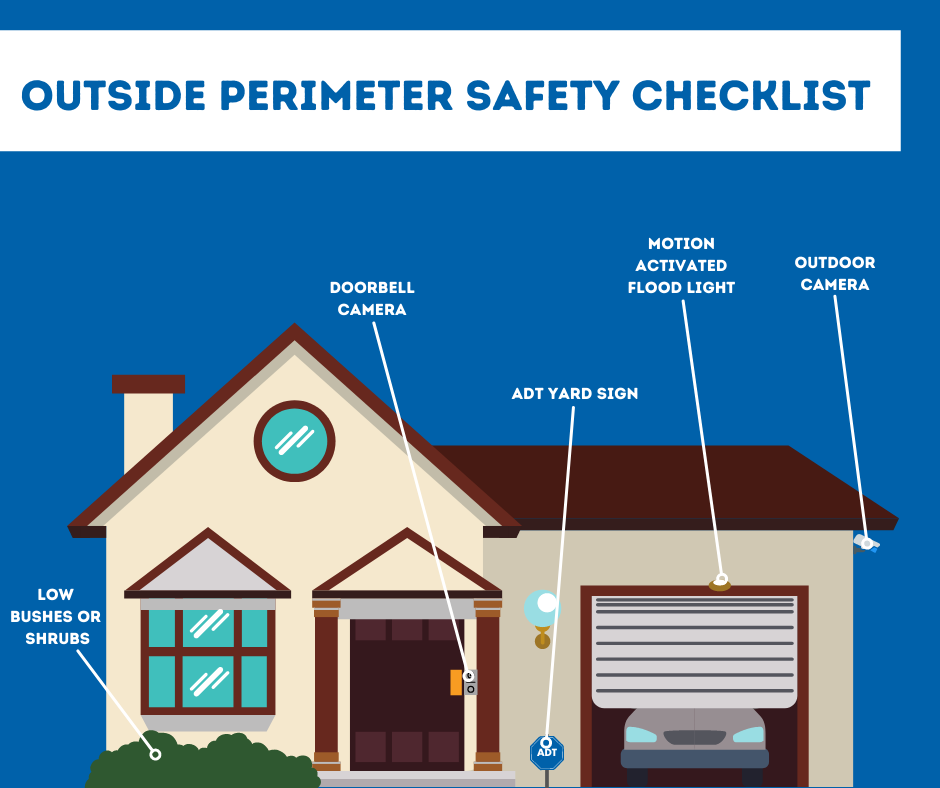
Outside Safety Checklist for Philadelphia
Your yard, driveway, and front walk are just as imperative to defend as the interior of your house. Use this checklist to make your outside safe:
-
Doorbell Camera: See who’s arrived at the front door before you open it and talk to guests. See deliveries and record video clips if they vanish off the step.
-
Outdoor Security Camera: You can place outdoor security cameras to alert you to suspicious lurkers in your yard. These security cameras are nice in places where you might not have a view -- like around a cellar or by the garage door.
-
Window Height Shrubs: Overgrown foliage can offer some serenity, but they also block your line of sight of the yard. Don’t provide potential burglars a place to hide. Plus, high shrubs or greenery too close to your house can clog gutters and invite pests.
-
ADT Signage: One of the most popular deterrents for home intrusion is telling would-be rogues that you have a monitored home security system. An ADT yard stick by the main walk and a window decal will show ne'er-do-wells that they should move on to an unprotected house.
-
Motion Activated Outside Light Fixtures: Light is the biggest deterrent to those who lurk in the dark. Motion-triggered flood lights on your deck, patio, or garage can shoo possible intruders away. They also help you work the locks when you get to the house on those dark, winter nights.
Use Secure24 Alarm Systems To Help You Finish Your Home Safety Checklist for Philadelphia
While Secure24 Alarm Systems can’t help you with non-security devices on your Philadelphia home safety checklist, we can discuss a state-of-the-art security system. With everything from alarms to thermostats, we can install the ideal system for your family’s needs. Simply phone (215) 798-2927 and talk to a professional or complete the form below. Or personalize your own ADT system with our Security System Designer.
